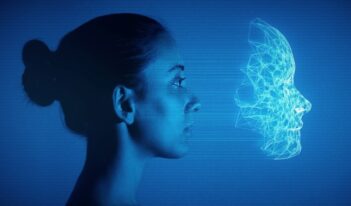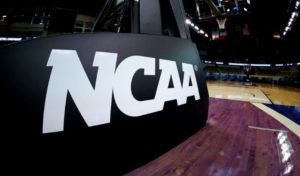
Scholar urges Congress to enact legislation to protect NCAA athletes’ biometric data.
Big data has begun to transform student athletics. Approximately 80 percent of student athletes report that their team uses athlete biometric data (ABD) tracking technology, including fitness tracking bands and Apple Watches, to develop an edge over the competition. Over 50 of the top National Collegiate Athletic Association (NCAA) basketball programs use tracking technology during games or practices.
Given the widespread use of wearable technology by NCAA teams, some sports industry leaders express concern about data protection and privacy rights.
In a recent article, Alicia Jessop, an associate professor and the Academic Director for the Institute for Entertainment, Media, and Sports at Pepperdine University, argues that greater regulation is necessary to protect the privacy rights of NCAA athletes. Jessop urges Congress to enact its first federal biometric-data privacy law and encourages NCAA athletes to understand their privacy rights under current state and federal law.
Biometric tracking devices have proliferated in recent years in large part because of their promise to deliver key health data on demand.
Jessop explains that ABD tracking devices provide coaches and other athletic staff members with greater data than traditional in-person ABD collection methods, including medical examinations. These tracking devices also allow coaching and athletic staff to track new forms of data, including athletes’ sleep time and location, she notes.
Jessop claims that athletics departments’ use of ABD tracking devices violates the Fourth Amendment of the U.S. Constitution in two ways. First, she argues that universities infringe on “a constitutionally protected area” of privacy—the athletes’ bodies—when a university requires student athletes to wear ABD tracking devices.
Second, Jessop argues that the practice does not fall into the Fourth-Amendment exception for “closely regulated” activities that justify searches for drug use, health, and safety.
Some public universities may argue that the use of ABD tracking devices is intended to monitor and protect NCAA athletes’ health, Jessop notes.
She argues, in response, that the majority of college athletes are legal adults. This fact distinguishes public universities’ interest in student health from health-related student searches executed at public high schools, Jessop notes. In Vernonia School Dist. 47J v. Acton and New Jersey v. T.L.O., the Supreme Court held that public high schools “can exert ‘a degree of supervision and control that could not be exercised over free adults.’”
To address the rising concerns over NCAA athletes’ privacy and owners, U.S. Senators Jeff Merkley (D-Ore.) and Bernie Sanders (I-Vt.) introduced the National Biometric Information Privacy Act of 2020. The bill includes a policy for the proper destruction of athletes’ data, disclosure requirements to athletes about biometric data, and a prohibition of the sale of biometric data.
Jessop suggests that the bill could be improved by recognizing the individual’s right to own their ABD. She further argues that NCAA member institutions, NCAA athletes, and Congress still need to take several additional actions to protect athletes in light of ABD tracking mandates.
First, Congress should require NCAA member institutions to provide NCAA athletes with specific disclosures about the types of biometric data that they will collect, how that data will be stored, and how their athletics department will use and benefit from it, Jessop contends.
Second, as included in the Merkley–Sanders bill, NCAA member institutions should dispose of an athlete’s ABD when the athlete graduates or leaves the university, Jessop contends. To adhere to these standards, she adds, NCAA member institutions should implement secure management systems for stored biometric data.
Third, Jessop urges NCAA athletes to educate themselves on how using university-provided ABD tracking devices may violate their Fourth Amendment rights.
NCAA member institutions may respond by noting that they obtain written, signed consent from their athletes, she explains. But Jessop maintains that athletes’ written consent to the use of ABD tracking devices may be involuntary. Universities may use “implicit or explicit threats” of decreased playing time or even removal from the team against athletes who do not consent to the collection of their data through ABD tracking devices, she explains.
To ensure that athletes’ consent is not coerced, Jessop recommends that NCAA member institutions inform athletes that they will not face consequences if they opt out of wearing ABD tracking devices provided by their university.
Finally, Jessop urges all athletes at NCAA member institutions to educate themselves on relevant state laws so that they can verify that their university has legally collected information from wearable ABD tracking devices.
Texas state law, for instance, limits the storage of biometric data to one year, Jessop explains. California state law grants individuals the choice to opt out from the collection of their biometric data at any time. Athletes also should be aware that the majority of states mandate that NCAA member institutions take reasonable security measures to store sensitive biometric data, she notes.
The wearable technology industry and the use of biometric data at NCAA member institutions will only continue to grow, Jessop argues. As a result, Jessop concludes that the additional actions she proposes are necessary to protect current and future NCAA athletes.



